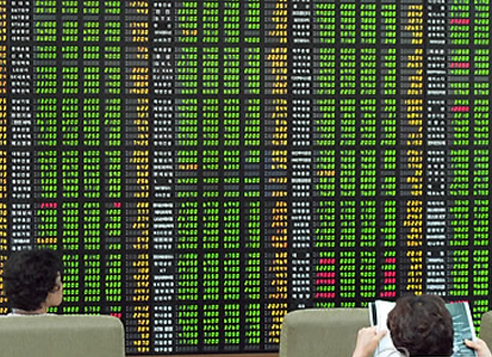Foreign investors purchased a net 530 billion won ($474 million) worth of stocks on South Korea's tech-heavy Kosdaq market in May, the most in 13 years, local data showed Wednesday.
The amount is the third-largest monthly net buying by offshore investors in the secondary Kosdaq market after 1.01 trillion won tallied in February 2000 and 723.4 billion won in April 2004, the Korea Exchange said. Foreign investors concentrated on buying IT and semiconductor shares.
 |
(Yonhap) |
Foreign investors bought 1.06 trillion won worth of stocks on the Kosdaq market more than they sold, during the first five months this year.
Analysts attribute the surge to investors moving to buy the undervalued secondary market from the benchmark Korea Composite Stock Price Index, which has risen sharply in recent months amid improving corporate earnings and resilient exports.
The main bourse KOSPI closed at 2,368.62 Monday, a sharp rise from 1,983.40 as of the end of May 2016.
"We see a cyclical rally as investors are shifting to small- and medium-capitalization stocks due to the sharp rise in the prices of large cap shares," said Lee Yong-gon of Hana Financial Investment.
Kim Dae-jun of Hankook Investment & Securities said the Kosdaq index began soaring as foreign investors sold large cap stocks at the main bourse and moved to IT stocks at the Kosdaq market.
Stocks of Kakao Corp., the operator of South Korea's top mobile messenger KakaoTalk, were the most popular among foreign investors with the net purchase of the stocks by foreigners reaching 86.5 billion won between May 1 and June 5.
Kakao Corp.'s share prices climbed 14.3 percent during the period.
Foreign investors also bought 60.6 billion won worth of stocks of SFA Engineering Corp., a display and semiconductor equipment provider; 38.4 billion won of Seoul Semiconductor stocks; 32 billion won worth of Nuri Telecom shares; and 16.8 billion won of SK Materials during the same period.
Chi Kee-ho of Cape Investment & Securities said the Kosdaq index will likely surge for the coming months, predicting the index may hit 700 points by November.
"It is highly likely that returns on large cap stocks may stagnate in the latter half of the year to prompt investors to move to small- and medium-capitalization stocks in the Kosdaq market,"
he said. (Yonhap)







![[Today’s K-pop] Blackpink’s Jennie, Lisa invited to Coachella as solo acts](http://res.heraldm.com/phpwas/restmb_idxmake.php?idx=644&simg=/content/image/2024/11/21/20241121050099_0.jpg)
